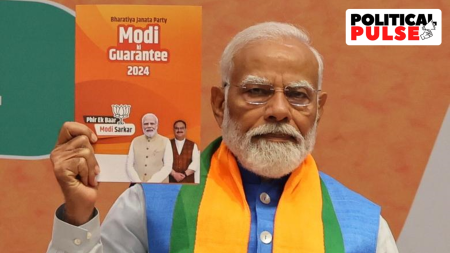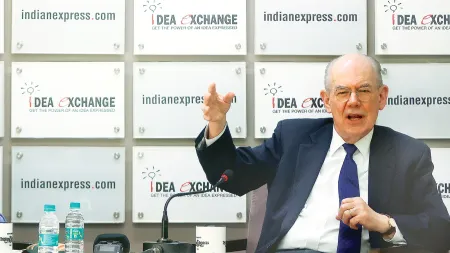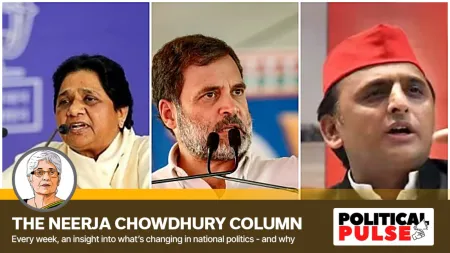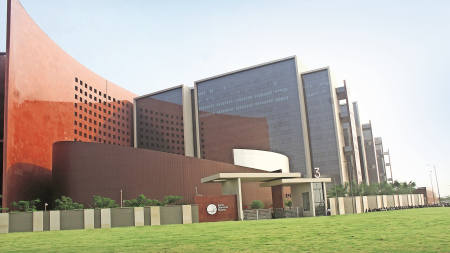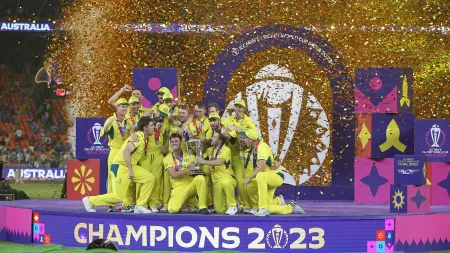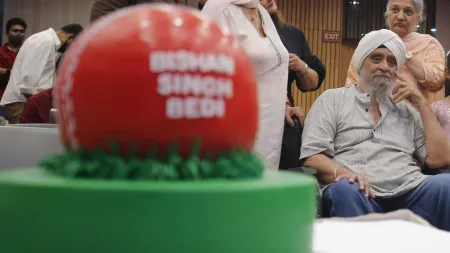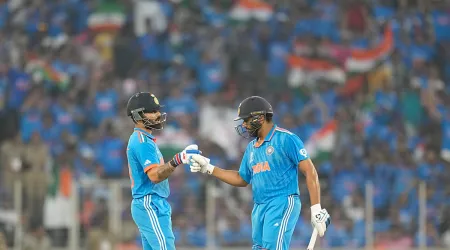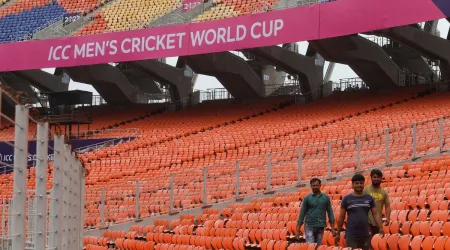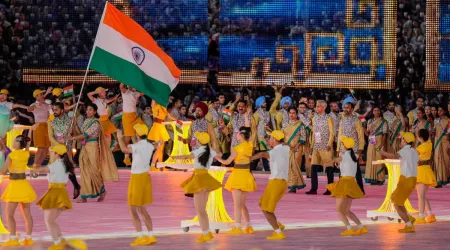- India
- International
Sushil Kumar or Narsingh Yadav: Biggest question staring Indian wrestling ahead of Rio Olympics 2016
There’s a generous sprinkling of politics and intrigue to the dilemma of who should be sent to the Olympics: Sushil Kumar or Narsingh Yadav.
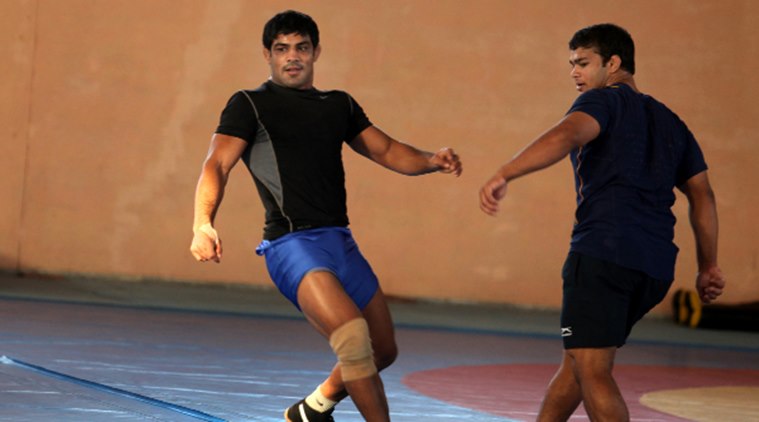 Sushil Kumar is a two-time Olympic medallist while Narsingh Yadav has earned the Rio Olympic quota.
Sushil Kumar is a two-time Olympic medallist while Narsingh Yadav has earned the Rio Olympic quota.
Sushil Kumar has stature and back-to-back Olympic medals. Narsingh Yadav has earned a quota alongwith a World Championship podium. There’s a generous sprinkling of politics and intrigue to the dilemma of who should be sent to the Olympics and if trials should be conducted or not. Mihir Vasavda takes a 360 degree look at the biggest question staring Indian wrestling in the face ahead of Rio.
It’s early March, the Indira Gandhi Indoor Stadium is hosting the wrestling trials for Olympic qualifiers. Winners wouldn’t get medals here but the stakes are high. No quarters given, none asked. Thousands have turned up to watch these duels. In the stands too, battle lines are drawn. Akhara alliances are deep-rooted in Indian wrestling. One contentious call by the referee triggers a mass outpouring onto the playing arena. Supporters, mostly wrestlers, jump over the 12-foot wall to throw their weight behind their man. Coaches and henchmen too join in. At the venue full of men with bulging muscles, fights are frequent and chaos prevails at all times.
But there was this moment, when the arena fell silent. It was when Sushil Kumar walked in. He swaggered in as if he owned the place. Actually, he does. Wrestlers stop their warm-up drills to touch his feet. Thousands wave from the stands, the federation officials on the stage also afford themselves a few smiles. India’s most successful sportsperson walks straight to a man dressed casually in a T-shirt, standing alone in a corner. Sushil slaps Narsingh Yadav on the back. Narsingh bends to touch his feet but Sushil, instead, wraps his arms and lifts him off the ground. The two indulge in a brief conversation before Sushil settles on the sofa next to Wrestling Federation of India (WFI) president Brijbhushan Singh Sharan. Narsingh sits a row behind, on a plastic chair.
They won’t fight today. Last year, Narsingh had already clinched India’s Olympic quota in the 74kg category. When they meet next, it will be to decide which one of them will represent India at the Rio Games.
Or so one thought.
A couple of months later, actually over the last 10 days, the federation has had a rethink on their original idea of conducting the trials. Some of its members feel they should stick to the past tradition of sending the athlete who has won the quota to the Olympics. In that case, Sushil will not be sent for the Rio Games. On that March afternoon, this scenario seemed impossible. Actually most thought, Sushil might head to Rio without trials.
Things have changed.

The buzz on the wrestling circuit these days is that Narsingh, the quota winner, will represent India. A Delhi HC verdict, fitness, form, training routine, lack of past precedents and fear of litigation are some of the alibis the federation has been using as it flirts with the idea of dropping one of India’s most celebrated and successful Olympians. It’s an extraordinary scenario the WFI finds itself in. On the one hand, you have Narsingh, who rightfully stakes a claim for an Olympic spot by winning the quota at the first opportunity itself and in the process, clinching a World Championship medal. And on the other, you have the country’s only two-time Olympic medallist and a former world champion.
Caught between a rock and a hard place, the federation is already fumbling.
The dilemma
In 2004, a certain Yogeshwar Dutt won the quota for the Athens Olympics at the expense of Kripa Shankar Patel, who claimed to be a better and fitter wrestler. The federation back then decided to select Dutt for the Games, a decision that was challenged by Patel. He dragged them to the court, claiming the quota belongs to country and not the individual who wins it and insisted that selection trials be held. But the court dismissed his plea while upholding the federation’s decision, ordering that if the wrestler who won the quota is fit and in fine form, then he should be selected.
While toying with the idea of sending Narsingh to the Games, the WFI is citing this court ruling. “In the past, we have always sent wrestlers who have won the quota to the Olympics. If we keep a trial, then it will be a departure from the past and also, we will have to conduct it for every weight category. We can even be dragged to the court,” says a senior WFI official.
This is their main argument as they prepare — what increasingly feels like — a case against Sushil. Another official is quick to point out to the uncertainty over the grappler’s fitness. Since the London Games four years ago, Sushil has taken part in just two tournaments. He has spent most time getting used to his new weight category (he moved from 66kg to 74kg) and nursing a shoulder injury.
And while his competition form is suspect, his physios say this is the ‘fittest he has ever been.’ “He has also been training alone. In Georgia, he trained 40km away from where rest of the team was practising with his own sparring partners. Even at Sonepat, he trains by himself. The chief coach has mentioned this to the federation, stressing that he hasn’t been able to monitor Sushil’s progress because of this,” the official says.
Sushil’s work ethic is stuff of legends. It’s never been questioned before and, not surprisingly, Sushil is dumbfounded. “I trained 40kms away because I was with the Georgian national team. I was practising with their Olympics-bound wrestlers. The purpose of foreign trips is to get exposure by sparring with some of the best from the world,” he says. “I know it’s a tough call. Narsingh is an exceptional wrestler and I am extremely happy for him. But I have been training relentlessly for this. I am confident the federation will take the right call.”
The intrigue
Several times in the past, athletes have pushed their cases for inclusion in Olympic-bound teams just on reputation. They’ve detested selection trials, feeling they’re above all that. Not Sushil, though. He wants it to be fair. A face-off with Narsingh, his only challenger in the 74kg category, will be the fair way out, he feels.
The federation, too, held this opinion for the longest time. But the sudden volte-face has raised eyebrows. That there are several members who are not even taking into account Sushil’s view is intriguing. An official said the selection committee will take a final call, but more specifically, it will be decided by the federation’s president Brij Bhushan Singh Sharan.
A BJP MP from Kaiserganj, Sharan often gets referred to as Bahubali, loosely translated as an influential strongman. His is the most commanding voice in wrestling matters.
There are murmurs of a troubled history between Sharan and Sushil’s coach and father-in-law, Satpal Singh. Sharan, they say, was also critical of some ‘senior wrestlers’ during sports ministry meetings when they decided to allocate funds. While not naming any wrestler in particular, he left little room for imagination as to which wrestler he referred to.
Some in the federation are also disappointed even now that Sushil skipped the Pro Wrestling League at the last minute, which severely impacted the tournament’s popularity. Satpal denies such claims but hopes there won’t be ‘politics’ played over team selection. “This isn’t about a rivalry between two factions or any wrestling clubs. This is about an Olympics berth. Narsingh is good, no doubt. But if Sushil goes, he will fight for the gold medal, nothing less,” Satpal, an Asian Games gold medallist himself, says.
Understandably, Narsingh isn’t on the same page. The quota winner wants to go to Rio without the proposed Sushil bout. “I respect Sushil a lot and what he has achieved in wrestling is unparalleled. He is a legend. At the same time, though, I have earned the right to be at the Olympics. It hasn’t happened before that the player who has won the quota has not been selected. I won the quota by winning a medal at the World Championships. My performances have been improving every year and I feel I deserve to be there.” To push his point, he adds: “Trials cause lot of distraction.”
The background
Picking one of the two will be a tough call. Such is the situation that one is sure to feel bitter and victimised.
Sushil and Narsingh’s paths were never supposed to intertwine. Sushil, son of a bus driver, grew up in a humble neighbourhood in West Delhi. The other, whose father was a milkman, was raised in a cattleshed in West Mumbai.
They met first at a national camp but never crossed each other’s paths. Sushil was the lord of the wrestling ring in 66kg category, winning every international medal on offer. But the international wrestling federation merged weight categories in 2013 to tighten its Olympic programme, which resulted in Sushil’s weight category being scrapped. He consequently moved to 74kg, where he would bump into a rapidly-improving Narsingh. Moving to a higher weight category has its own sets of challenges and Sushil, still recovering from the hangover of London Games silver, had to introduce an array of changes to ensure the transition would be smooth. But he injured his shoulder while training, which severely hampered his plans.
He remained out of action for the whole of 2013 and returned to the mat for the first time since the Olympics at an invitation tournament in Italy in 2014. He won a silver there (Narsingh would win gold at the same tournament a year later) and followed it up with a gold at the Commonwealth Games. But the level of competition at the CWG is such that Sushil would win it even with his eyes closed.
When the time came to select the team for the 2015 World Championship, Sushil’s shoulder injury resurfaced. He chose not to risk it, which gave Narsingh, who contested in this category at the London Games and finished 13th, the opening he was looking for. Not many would have bet on Narsingh doing well at the worlds, let alone returning with a quota. Sushil and his team thought they would be fit in time for the next Olympic qualifiers, which were scheduled six months later in March 2016.
But Narsingh defied all expectations, winning the bronze medal to pick up one of the three quotas on offer. And he was mighty impressive in Las Vegas, beating London Games bronze medallist Lopez Azcuy and junior world champion Zelimkhan Khadjiev en route. It highlighted his steady progress since the 2010 Commonwealth Games, where he burst onto the scene. He followed up a fifth-place finish at the 2013 Asian Championship with a bronze in the 2015 edition. He improved on his seventh place at the 2010 Asian Games with a bronze at the 2014 Incheon edition. At the 2015 World Championships, too, he bettered his previous best finish of fifth, managed in the 2013 edition.
All this shows he has done enough to merit a place on the Rio-bound contingent. And in normal circumstances, it’s a no-brainer that Narsingh would have been on the plane. But his achievements dwarf when compared to Sushil’s. Although he has competed in only two tournaments since London, Sushil’s stature is such that it will be tough for the federation to leave him out. After all, how many athletes have come close to winning back-to-back Olympic medals?
The duo hasn’t met before in a major competition. Satpal says they have met only once around five years ago in an inter-railways tournament, where Sushil had ‘easily’ defeated Narsingh in the 84kg category. “That time Sushil used to compete in 66kg category. To test himself against stronger wrestler, he competed in the 84kg and he defeated Narsingh. This isn’t to suggest that he can beat him again. Narsingh has improved a lot so it will be tough. But there should be a fair trial,” Satpal says.
The Rio Roulette
This isn’t the first time the countdown to Olympics has seen such a complex debate. Ronjan Singh Sodhi, the former world No. 1 double trap shooter, relates to the scenario well. Going into the 2008 Beijing Olympics, Sodhi was the world’s second-ranked double trap shooter. He had equalled then world record score of 194 out of 200. However, Rajyavardhan Singh Rathore, the silver medallist of the 2004 Games, had already earned the quota in 2006. His form since then, however, had been suspect.
On form, Sodhi would have been on the flight to Beijing but the shooting federation decided that since Rathore had won the quota, he should be sent. Eventually, Sodhi lost out to Rathore. “At that time, the criteria were different. I believe after this incident the selection policies were changed and they started conducting trials. So at London, even though I was the world No. 1 and had won a quota, there were trials,” Sodhi says.
Sodhi gives a neutral view. He believes the fairest way would be to conduct a best-of-three, or four, round trials to decide who should go to Rio. “Look, it’s safe to say that no other athlete in the country has managed what Sushil has. Sushil is a kind of athlete who won’t go to Rio just for the sake of it. He will go there to win a medal. So we can’t leave him out just like that,” he says. “At the same time, Narsingh has shown he is very good by winning a world championship medal. So when you pit the two against each other, it’s tough to judge who’s better in just one bout. You can have three, four matches, see who performs better and then send that wrestler. I am not aware of what wrestling’s selection policy is and I am sure the federation guys have their plans. But this is a fair way I guess.”
Sushil Kumar (32 years)
* Returned to the mat after two years at the City of Sassari Tournament in Italy, winning the silver medal in the 74kg category. Followed it up with a gold at Commonwealth Games. Has had just two international outings since the London Olympics. Going into the 2012 Games, he took part in 8 tournaments.
* Shoulder injury is one reason he missed the World Championships last year. Has spent major part of the last two years getting used to the new weight category and nursing injury.
* Back-to-back medals at Beijing and London Games, besides the World Championship gold, make him the most successful Olympic athlete in India. He thrives in big-match scenarios.
Narsingh Yadav (26 years)
* Is going through a purple patch, winning a medal at the World Championship, Asian Championship and Asian Games (all bronze) in the last two years. Has taken part in nine tournaments since a disappointing London Olympics but has managed a top-five finish in every competition.
* Ranked fifth in the world. Won the Olympic quota by clinching the bronze medal at the World Championship in Las Vegas last year, where he beat London Games bronze medallist Lopez Azcuy of Cuba.
* For long, he has struggled in big tournaments where he has buckled under pressure. But has reversed the trend in the last two years. Has remained injury-free largely. Rather, he has added more muscle and is at peak of his fitness.




